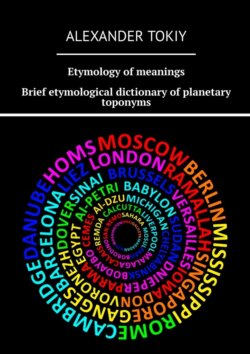Читать книгу Etymology of meanings. Brief etymological dictionary of planetary toponyms. At the origins of civilization - Alexander Tokiy - Страница 8
Get to the truth
ОглавлениеAny work requires a reliable tool – even if we decide to make a mental journey to the language’s origins. The science of etymology seems to have been created in order to restore broken connections in the meanings of words. It is designed to look inside the form, “in-form” about the origin and meaning of the word, to tell about its metamorphoses – what happened to this word once and what is happening to it now.
The word “etymology” (ττυμολογία) is a Greek word. It consists of two words: “etymon” (ττυμον) is the “truth” and “logos” (λόγος)is “to speak”. It was invented by ancient philosophers, who already understood perfectly well that without knowledge of the true meaning of the word, it is impossible to know the truth.
The first sound “e” indicates some kind of affiliation. In the words “ego” and “ekho” (echo), it explains that it is about the person. In the word “eco” is about something what surrounds person, about his\her home, environment. Behind the word “etika” (ethics) lies a reasonable, meaningful human activity. Even the word “efir” (ether) has its own identity – literally, “belonging to a hole” filled with something invisible, but necessarily all-encompassing and all-pervading. The words “Hellenic” and “Hellas” are about places that belong to my favorite Greeks, where “lada” is in the same semantic field as the Russian “lad” (harmony).
In the word “etymon” (the meaning of the word), the protoroot “mon” is the key, which means that truth is unique and “monarchical”, as well as harmony. “Mon” is the only one who brings food, who is the “master of offspring”, and any other “mn” can not be. These are the harsh conditions of existence. This protoroot has generated a lot of words, which emphasize the separateness, uniqueness, exclusivity. It is sound in the words “monakh” (monk) and “monarkh” (monarch), in the names Solomon and Suleyman; it can be found in the word “ataman” (father, senior man) and in the word “mongol” (mon-Ka-le, nomad).
The brilliant Russian conductor Teodor Curentzis once said that harmony is a point. How right he is! Harmony is the point, the unity, of which the first biblical commandment speaks. So “etymon” is a unified understanding of our actions, our existence. This is the truth.
The second part of the word “etymology” goes back to the biblical “logos” (word). Academician Dmitry Likhachev has repeatedly warned that we understand or interpret some ancient texts incorrectly. In his opinion, the translation of the gospel text: “In the beginning was “logos” (word\“slovo”)—incorrectly conveys the meaning of the word “logos”. In the ancient Greek Dictionary of Joseph Dvornitsky, “logos” has 34 different “nests of meanings”. In our reading, this word goes back to three ancient roots: “lo”, “kho” and “s”. The first has the meaning “beloved”, the second is the sound of breathing-means “dusha” (soul), and the third means “sacred water”. What meaning could these sounds have acquired over the centuries? We can agree with academician Likhachev that we are talking about what distinguishes man from the animal world – about the ability to think.
However, Likhachev could be wrong because as the great Russian poet Fyodor Tyutchev said: “A spoken thought is a lie.” Fedor Ivanovich knew perfectly well that the ancient Greek word “legu” is translated as “to speak”, but in Russian it is interpreted quite differently. Still, let’s focus on what is close to us. “Etymology” is the desire to get to the truth, to understand the meaning and essence of our being. Jesus Christ, pronouncing the Covenant: “Verily I say unto you,” I sincerely wanted people to get rid of lies, deception and delusions. So we are trying to understand and interpret the deep meaning of our language, our speech, our being.
